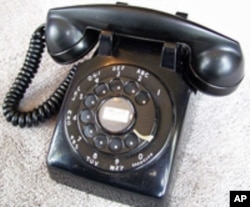From fax machines and airport goodbyes, to handwritten letters and handkerchiefs, things that were once an everyday part of American life are disappearing. In Obsolete: an Encyclopedia of Once-Common Things Passing Us By, Anna Jane Grossman says those objects held meaning.
Not everything improves when technology advances
In her book, Grossman notes that many fading items made sounds. The ring of an old-fashioned rotary dial telephone is one example. Fifteen years ago, Grossman replaced an old phone as a favor for an elderly friend. When her friend couldn't read the smaller numbers on her jazzy new cordless touch-tone phone, Grossman got her first sense of how bittersweet progress could be. "We sort of assume that creating something new necessarily means creating something better," she says.
Grossman cites iPods and other digital music players as more examples. Her iPod contains thousands of songs she selected. Yet she still has a soft spot for the mix tape compilations of her teenage years. "I don't think [they] brought me less joy than my iPod brings to me today," she says.
Boom boxes once provided street soundtracks
For Grossman and many others, joy was often found in sharing music out loud on so-called boom boxes or ghetto blasters. She recalls people carrying huge battery-operated radio cassette players on their shoulders for the musical pleasure - and sometimes annoyance - of passersby. But Grossman says that today, when most people listen to their own music through ear phones, "we're missing the experience of sharing the music with people around us. We are each in our own little aural universe," she says.
Boom boxes blasted music from AM radio stations. Today, almost all radio music is broadcast on the higher fidelity FM band. However, because AM radio waves travel farther through the Earth's atmosphere than FM, one could often hear music from stations hundreds or even thousands of kilometers away. And before digital tuning, it was a special thrill to turn the radio dial to catch one of those faraway stations. "The thumb and the forefinger have so much less to do these days," Grossman observes.
In 2009, the author enjoys podcasts and online radio. She appreciates the nearly infinite variety the Internet makes possible. "On the other hand," she notes, "I don't think we have as many cultural references we can share with the person next door."
Without laugh tracks it's just not funny anymore
Americans used to share a laugh with other audience members at the movies or in theaters. As TV became popular in the early 1950s, they could still feel like part of a crowd, thanks to laugh tracks. But Grossman says canned laughs have been fading away as Americans become accustomed to being entertained alone.
Grossman observes that even CDs and DVDs are becoming obsolete, at least for their intended purposes. "In my [Brooklyn] neighborhood, people put them on their windowsills face down and it keeps pigeons away. I've [also] seen people use their old Rolodex address books as photo albums," she says.
Photo albums are also being replaced by images viewed online or on a computer screen. For Grossman, the disappearance of our past into cyberspace is the price we pay for our computerized world. E-mail correspondence is often simply deleted, erasing the often intimate minutiae that connect us.
E-mail may be replaced by even terser technology
Typewriters have become almost completely obsolete. Grossman revises her books on her computer; no more crumpled drafts on paper to record the creative process. But she says the act of dipping a pen into an inkwell, or inserting fresh paper into a typewriter carriage had its rewards. "It slowed down our thought process and gave us time to reflect as we were writing in a way that we can't quite do when we are typing at 100 words per minute on our laptops."
Grossman says that even e-mail has become mostly a thing of the past for many high school and college students except when they are communicating with professors and older relatives. "Otherwise, they are text-messaging; they are Tweeting; they are using Facebook. And all those are forms of communication that have to be quite short," she says. Grossman predicts that the trend toward terseness will continue. "I wonder if someday we're just going to be shouting one-syllable words at each other like monkeys," she says, noting, "Yes, it's progress. But it definitely waters down the kind of relationships that we have."









